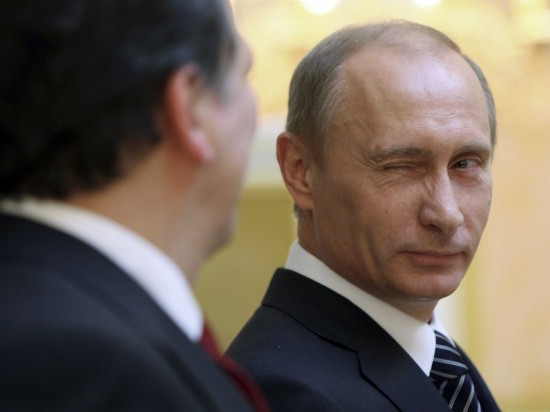Russian President Vladimir Putin’s statements, affirmations and denials in recent months have caused the US State Department, the New York Times, and other news agencies to begin to publish articles labeling his words “lies,” “fiction” and “false claims.”
Putin has maintained strong stances against accusations of Russian involvement in Crimea and Eastern Ukraine, as well as on the purpose and presence of Russian troops stationed near the Eastern Ukrainian border, but realities have shown otherwise.
On April 17 chinks in the veneer began to show when Putin publicly stated that Russian troops were at work in Crimea from the outset. Putin had previously denied any Russian participation in Crimea. The Russian representation at the UN and Russian diplomats in serving in foreign countries had also vehemently denied accusations of Russia’s actions. In the same nationally televised presentation, Putin referred to Eastern Ukraine as “New Russia,” but continued to deny that so-called pro-Russian forces attacking buildings in Eastern Ukraine and calling for Russian intervention and Crimea-style referendums to separate from Ukraine were Russian soldiers. Putin called such allegations “all nonsense.”
Justifying the pro-Russian presence in Crimea, Putin stated, “They acted politely, but resolutely and professionally. There was no other way to hold the referendum in an open, honest and honorable way and allow the people to express their opinion.”
On April 20, the New York Times reported on photos endorsed by the Obama administration linking the “green men” operating in Eastern Ukraine to the Russian military. The Ukrainian government also announced they had proof the forces were Russian in origin.
Then, on May 17, Ostro reported that the head of the self-proclaimed Peoples Republic of Donetsk (DRP), Aleksandr Boroday, had told a press conference that the forces in Crimea and those in East Ukraine were under “a single command” and that he had worked in Crimea as a spin doctor.
A of group of the DRP, who had forcefully occupied Donetsk government buildings, pronounced a separate state April 7, and held a Crimea-style referendum May 11. The DRP announced that the turnout for the referendum was 75 percent and the vote was 89 percent in favor of separation from Ukraine.
During the original Crimean occupation by Russia–which at the time was not admitted to be participated in by Russia–Russia amassed a sizable military force near Crimea on Russian soil, but after the peaceable annexation of the peninsula in the wake of the March 16 referendum, the force was withdrawn. A force then amassed on the borders of Eastern Ukraine. Originally, the Russian government denied any buildup of troops. Then Putin continuously maintained that the buildup was for military exercises, of which NATO and other organizations reported they had seen no evidence. At the end of March Putin announced that the massive Russian force had been ordered to withdraw, but NATO and other organizations reported that they had seen no evidence of withdrawal. Then again on May 19, Putin publicly ordered the forces Ukrainian border to return to their home bases, and said that the withdrawal had started. Again, NATO stated that it had seen no sign of soldiers returning to their bases.
The response to Putin’s words and the contrast with Russian actions have caused Western politicians and media to begin to label Putin as a falsifier and a liar. On March 5 the Office of the Spokesperson of the US State Department published a statement on the US State Department website titled, “President Putin’s Fiction: 10 False Claims About Ukraine,” where the office lists 10 of “Putin’s recent claims justifying Russian aggression in the Ukraine, followed by the facts that his assertions ignore or distort.”
On March 6, the New York Times–America’s second-largest newspaper by circulation and most popular with internet readers–covered the Russian response to the US State Department article, but in its headline called the 10 Russian claims “Lies.”
The long list of news organizations which have begun to publish articles on Putin as using lies include Forbes, the National Post, and Telegraph UK.
A senior White House official commented on the most recent statements by Putin about the withdrawal of troops on the eastern border of Ukraine, “As you’ll recall, they’ve made similar claims before. They made them at the end of March and didn’t follow through, so we’ll be tracking this closely over the course of today and the coming days, and we’ll want to see clear, firm evidence of this move before we make any judgment.”
By James Haleavy
Sources:

Link, please?
How ignorant are you? Even the New York Times have been forced to print a retraction about false claims made by the US state department, the pentagon and NATO you have listed. Putin is not a lier.